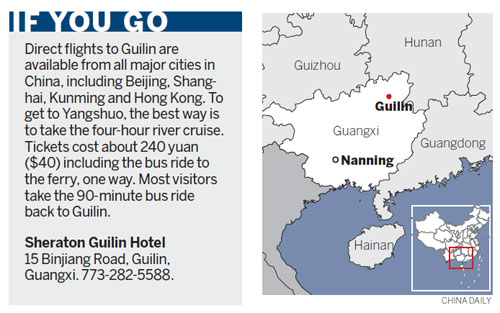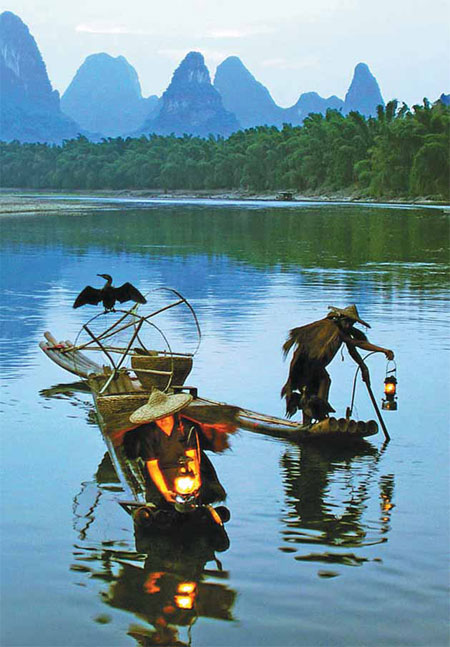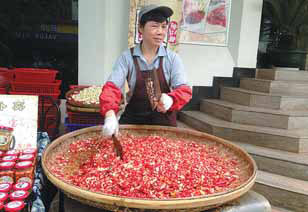Flowing water, towering hills
Updated: 2013-05-30 07:14
By Pauline D. Loh (China Daily)
|
||||||||
|
The picturesque Lijiang River comes alive as local fishermen set out for the morning's catch. Liu Xianglong / Asia News Photo |
|
Chili bean paste is one of the hottest products in Guilin. Pauline D. Loh / China Daily |
They say water nourishes man and that woman is made of water. It is only when you visit Guilin that you realize the truth of this. Pauline D. Loh pays a pilgrimage to the world-famous Guilin hills and the river that flows through them.
Have you noticed the beautiful scenery on the back of a Chinese 20-yuan note? Even in sepia tones, the hills are breathtakingly beautiful, rising almost upright from the banks of the Lijiang, the "flowing water" that cuts right through Guilin in Guangxi.
Now we have the geography mapped out, we can get down to real details like how proud the residents of Guilin are of this river.
In fact, Guilin natives take pride in all they have - the wonderful moist climate which the women claim gives them their famous complexion, the snail noodle dish now widely exported to major cities all over the country, the famous chili bean paste, and of course, the unique Arhat fruit or luohan guo, the latest all-natural sweetener to fascinate the health-conscious community worldwide.
Guilin literally translates into "osmanthus woods" and the city is similarly famous for its incredibly aromatic osmanthus flowers, frequently used to infuse and scent the green tea which grows on the steep slopes of the karst hills.
In season, ancient osmanthus shrubs as tall as trees deodorize the air above the Lijiang River as it meanders through the Guilin city center.
We were fortunate to stay at the oldest international five-star hotel in town, the Guilin Sheraton, and we made it our base to explore the river and trawl the food streets just behind the hotel. There is also a convenient traditional Chinese massage center across the street where we sought much needed relief after a day clambering up and down steep slopes.
It is probably also the only hotel where you can gaze upon the Lijiang out of your window and watch its changing mood as it turns clear when the weather is fine, or murky and angry as heavy rains whip up little waves on its surface.
The famous Elephant Trunk Hill is also mere minutes away.
In the early hours, you can see Guilin residents out in full force by the banks, waving lethal-looking swords and huge red fans or little ping-pong bats, intent on practicing their martial arts or dance sequences.
You can tell they are a healthy lot, unlike the sedentary lazybones from Beijing exercising vicariously from hotel windows.
But we were roused from our osmanthus tea-fuelled comfort by the offer of a trip up the Lijiang to the tourist town of Yangshuo, where Chinese director Zhang Yimou had invested his first major song-and-dance-and-light spectacle, Impression Liu Sanjie.
In case you are wondering, Liu Sanjie or Third Sister Liu is a local legend, a peasant girl with the voice of an angel and the quick wit of a vixen who had outwitted and out sung the local tyrant, an evil landlord and his cowardly scholar henchmen. This is all according to a 1960 film, of course.
The river is beautiful, and all we needed for that long, leisurely cruise down to Yangshuo were earplugs.
Guilin and Yangshuo are the twin attractions on every Chinese tourist's must-do travel list, and it did seem that every Chinese tourist and his uncle, aunt, second cousins twice removed were on our boat that day.
The excited cacophony became so overwhelming that we forked out an extra 600 yuan ($98) for a private cabin. Even so, it was in need of better soundproofing because the noise was dimmed but still intrusive as we gazed pensively out at the calm of the hills and fervently wished it were the hill songs that were echoing in our ears.
But the scenery was worth the trip, above all else. The karst hills were awe-inspiring, fringed on the water's edge by phoenix-tail bamboo, which veiled little hamlets of small holdings.
The cruise guide's commentary also allowed our imagination to take flight.
"Here is the five-horses mural which nature painted on the hillside ... This is the Goddess of Mercy, flanked by her two child attendants This is the hill that looks like a three-pronged pen-holder"
And then his voice was drowned out by a burst of excited chatter as everyone whipped out their 20-yuan bank note and tried to identify the scenery that inspired the design.
It was long past lunchtime when we finally reached the Yangshuo jetty where a fisherman and his cormorants were waiting.
Be careful, though.
Every time you snapped a photograph of the birds, you have to pay their owner 5 yuan. Some enterprising tourists foiled his mercenary attempts with a number of surreptitious under-arm shots.
More evidence that Yangshuo depends almost solely on tourism for its livelihood are the twin rows of souvenir stalls that lined the jetty walkway for a full 500-meter.
Resist the temptation of the "genuine Miao tribal silver bracelets", the "root carvings from real bamboo", the colorful sarongs that looked as if they had been made in Bali or Phuket, and the pretty sunhats that must have been made in Dongguan, Guangdong province.
About five to 10 minutes' walk away is the main pedestrian mall in Yangshuo. Read "more shopping". But here at least, the prices will be a fraction of those at the jetty.
There is plenty of natural beauty to be seen in Yangshuo, if you leave the well-beaten tourist paths in the company of a local friend.
Red-earthed country lanes lined by lush bamboo groves seduce the hiker or the cyclist. When you climb high enough, you can enjoy a bird's-eye view of the Lijiang River, and that is when you will truly understand why it is one of the most beautiful waterways in the whole of China.
Any place you travel to in China will boast regional dishes that you will be urged to enjoy. In both Guilin and Yangshuo, there is braised river fish in beer sauce, stuffed snails not unlike a very spicy escargot, and chilies, lots of chilies.
Wash it all down with Arhat fruit tea. It will leave a sweet aftertaste you will keep with you long after the Guilin hills are a fading picture in your memory.
Contact the writer at paulined@chinadaily.com.cn.

(China Daily 05/30/2013 page19)

 'Taken 2' grabs movie box office crown
'Taken 2' grabs movie box office crown
 Rihanna's 'Diamonds' tops UK pop chart
Rihanna's 'Diamonds' tops UK pop chart
 Fans get look at vintage Rolling Stones
Fans get look at vintage Rolling Stones
 Celebrities attend Power of Women event
Celebrities attend Power of Women event
 Ang Lee breaks 'every rule' to make unlikely new Life of Pi film
Ang Lee breaks 'every rule' to make unlikely new Life of Pi film
 Rihanna almost thrown out of nightclub
Rihanna almost thrown out of nightclub
 'Dark Knight' wins weekend box office
'Dark Knight' wins weekend box office
 'Total Recall' stars gather in Beverly Hills
'Total Recall' stars gather in Beverly Hills
Most Viewed
Editor's Picks

|

|

|

|

|

|
Today's Top News
Shenzhou X astronaut gives lecture today
US told to reassess duties on Chinese paper
Chinese seek greater share of satellite market
Russia rejects Obama's nuke cut proposal
US immigration bill sees Senate breakthrough
Brazilian cities revoke fare hikes
Moody's warns on China's local govt debt
Air quality in major cities drops in May
US Weekly

|

|










